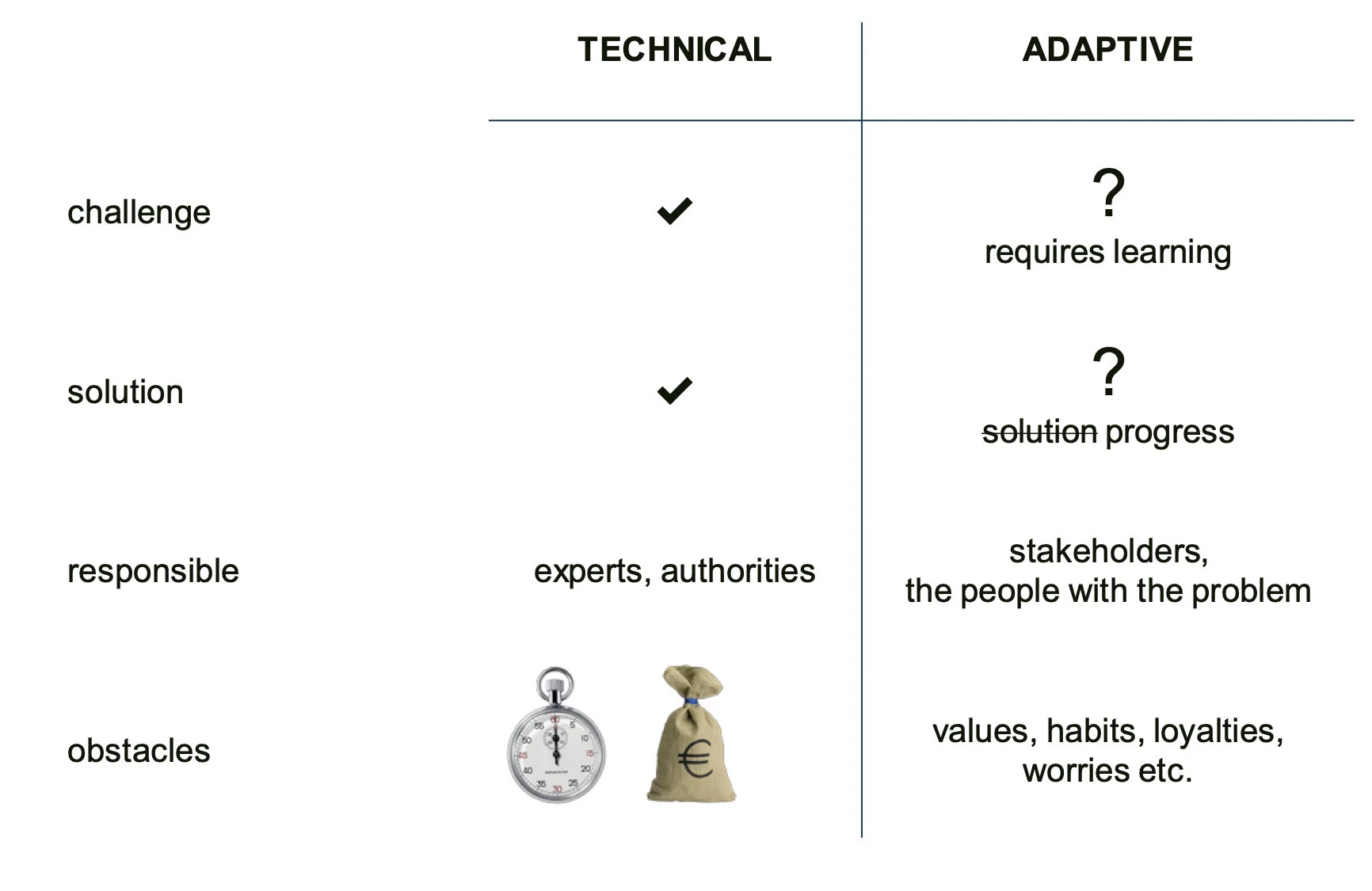Whenever I facilitate a leadership workshop, I stand in front of the room as a supposed expert and feel the group’s expectations of me: Tell us what to do. Tell us what is right and what is wrong. The pressure to offer quick fixes and simple solutions, to please (or at the very least not to fall from grace) is immense. Sometimes I am able to give guidance and advice – but sometimes I cannot. Because I, too, do not know the answer. Or because I will never actually know – because people will have to have to cut out their own path.
This mirrors many peoples’ experience in their professional lives, especially if they have authority and people look to them when times are tough. In these situations, when should leaders offer solutions? When should leaders delegate problem-solving to experts? And when should leaders create spaces for the affected people to come up with their own answers?
Here’s a distinction that can help approach these questions more deliberately: It depends on the type of challenge you’re facing – whether that challenge is technical or adaptive (Heifetz 2009). Here’s an example to illustrate the difference between the two:
In most of the industrialized world, a patient experiencing a heart attack will –luckily– quickly be brought to a hospital. There, doctors will diagnose that the blood supply to the heart is blocked. The problem is clear. From this, the responsible doctors will deduce a clear solution: A medicine or surgery is needed to remove the blockage and restore blood supply to the heart. The problem is “solved”. The patient can readily delegate problem solving to the experts (in this case doctors and nurses). Where obstacles exist, these often lie in the realm of resources (time, money, or a country’s medical infrastructure). This type of challenge is technical.
After the surgery the patient is confronted with a whole new type of challenge: Recovery, rehabilitation and prevention. Here, the doctor will tell the patient: You have heart disease – but we don’t know what’s causing it.” Changing one’s diet, managing stress, being more physically active – all these might be solutions, but they’ll differ from patient to patient. Moreover, none of these are “solutions” the patient can delegate to the doctor. He or she has to change their own behavior. And none of the solutions are the neat-and-tidy kind amenable to a check mark – they’ll require ongoing effort. Money, time and resources are less likely to be obstacles than our habits, values, culture, loyalties, or worries. These types of challenges are adaptive (example taken from Heifetz 2009).
Distinguishing between technical and adaptive challenges can help you exercise leadership more strategically. When I’m confronted with a problem that is primarily technical in nature, I can solve it as an expert (or I look for someone who has that expertise). When a challenge is primarily adaptive in nature, my job is to help the affected people learn. This means I have to be able to “give the work” of learning and change “back”. And it means I have to build a stomach for complexity and uncertainty.
Many of the problems we are confronted with in our professional lives have technical and adaptive components. Here’s an example from our practice as consultants: A client of ours is a company that would like to promote collaboration amongst its staff working in different divisions and locations. To do this, the company has hired programmers to develop an online platform with a chat and video conferencing function. This is a technical solution to technical components of their challenge. But half a year later, little has changed. Few staff visit the online platform and during conference calls, staff are preoccupied with looking good and covering up. This part of the challenge is adaptive. In our work as consultants, we often find that the adaptive work is neglected – causing change to stall. Shining the spotlight on adaptive challenges and helping individuals and organizations make progress on them is crucial leadership workshop.
What are your experiences with different types of challenges? Can you think of examples when problems were confronted on a purely technical basis? And how do you approach adaptive challenges?
Based on: Heifetz, R., Grashow, A., Linsky, M. (2009). The Practice of Adaptive Leadership. Boston, MA: Harvard Business School Press.


